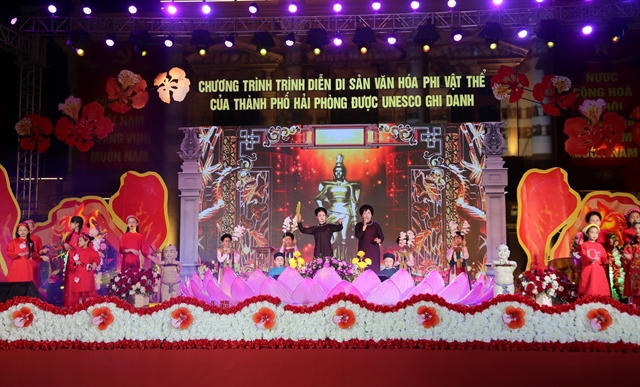 Life & Style
Life & Style


|
| Ca trù performance that opens the art programme in Hải Phòng City. VNA/VNS Photo Minh Thu |
HẢI PHÒNG Performances of intangible cultural heritage recognised by the United Nations Educational, Scientific and Cultural Organisation (UNESCO) entertained the audience in Hải Phòng City on May 5 evening.
The northern city and several other localities have two UNESCO-recognised heritage, namely ca trù (ceremonial singing) and Practices related to Vietnamese beliefs in the Mother Goddesses of Three Realms.
The programme aimed to raise the public’s responsibility to preserve and spread heritage values, and educate them on patriotism and pride in cultural traditions of the nation in general and Hải Phòng in particular.
It was also an opportunity to praise and recognise contributions of artisans and artists.
Inscribed in 2009 on the List of Intangible Cultural Heritage in Need of Urgent Safeguarding, ca trù is a complex form of sung poetry found in the north of Việt Nam using lyrics written in traditional Vietnamese poetic forms.
It has 56 different musical forms or melodies, each of which is called thể cách. Folk artists transmit the music and poems that comprise ca trù pieces by oral and technical transmission, formerly, within their family line, but now to anyone who wishes to learn.
Meanwhile, the practices in the Mother Goddesses of Three Realms (heaven, water, and mountains and forests), inscribed in 2016 on the Representative List of the Intangible Cultural Heritage of Humanity, aim to meet spiritual needs and everyday wishes of Vietnamese people.
The Mother Goddesses include Liễu Hạnh (a nymph who descended to earth, lived as a human and became a Buddhist nun) referred to as the Mother of the World, and other spirits considered legendary heroes. The traditional practice involves daily worship and participation in ceremonies and rituals like the spirit possession ritual and festivals. VNS




